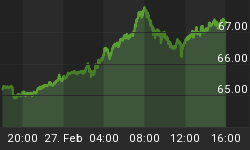Below is an extract from a commentary originally posted at www.speculative-investor.com on 30th March 2006.
Those who argue that the US cannot avoid a deflationary outcome will often support their case by pointing to the experience of Japan during the 1990s. The Japanese monetary authorities, so the story goes, were unable to prevent the slide into deflation despite their concerted efforts to promote inflation.
The first thing we'll note is that Japan didn't actually experience deflation during the 1990s. The following chart shows that although Japan's year-over-year M2 growth rate plummeted following the bursting of the stock market bubble, apart from a slight dip below zero during the second half of 1992 the money supply continued to expand (albeit at a very slow rate). Since deflation is a contraction in the total supply of money it therefore doesn't make sense to cite the Japanese experience of the 1990s as an example of how deflation cannot be voided once a credit-induced asset price bubble bursts. It is true, however, that over the past 50 years Japan has come closer to genuine deflation than any other major economy.

Japan is actually a good example of how deflation CAN be avoided under the current monetary system even in the face of collapsing stock and real estate bubbles. However, it's one thing to avoid outright deflation and another thing entirely to keep inflation going at the rate desired by the authorities. Using the above chart it could be argued, for instance, that the Bank of Japan (BOJ) might have avoided deflation but it proved to be incapable of generating any significant inflation after the boom turned into a bust.
Our view is that the BOJ and Japan's Ministry of Finance had the power to do a lot more to promote inflation than they actually did. For example, throughout the 1990s the Japanese banking system laboured under the weight of massive non-performing loans. Had this non-performing loan crisis been 'handled' in the same way that the "Savings and Loan Crisis" of the 1980s was handled in the US, that is, had there been some form of government bail-out of the banks using newly-printed Yen, Japan's inflation rate would have been considerably higher.
The Japanese monetary authorities were, we think, hamstrung by the incredibly high savings rate of the voting public. To be specific, when a large chunk of the public's savings are held in the form of cash and income-producing securities a monetary policy that significantly lowers the value of the currency will probably not be popular, especially when it is clear that the currency is being devalued as part of a plan to 'paper over' the lending mistakes of large banks.
The US Federal Reserve obviously isn't operating under the same political constraints as the BOJ because the average member of the US voting public has very little savings and is up to his/her eyeballs in debt. Also, there might have been a better chance of the US following Japan's path if Japan had never followed this path in the first place. That is, the Fed has fewer restrictions on its ability to inflate as well as the luxury of being able to learn from the BOJ's post-bubble experiences.
At this point it's important to note two things. First, although people with lots of debt and no savings will generally prefer inflation, keeping the voting public happy between now and the next election is not the only, or even the main, reason why more inflation is in store for the US over the next several years. The main reason is simply that the current system could not survive a period of deflation. It's a giant Ponzi Scheme, which means that the supply of money MUST continue to expand or the system will collapse. Second, inflation doesn't make anything better. It can create the illusion of prosperity for a while, but the misdirection of investment that it causes always leads to slower real growth (which, ironically, provides the excuse for the central bank to facilitate more inflation).
Lastly, we find it both interesting and strange that the "Fed won't be able to stop deflation in the US for the same reasons that the BOJ couldn't stop it in Japan" argument continues to pop up even though there is now a lot of empirical evidence that the US is following a very different path to the one followed by Japan during the 1990s. In particular, whereas the money-supply growth rate in Japan 'fell off a cliff' shortly after the bursting of the stock market bubble, in the US the year-over-year M2 growth rate rocketed to a 20-year high during the first two post-bubble years and averaged around 7%/year during the first four post-bubble years (refer to the following chart for details). The rate of monetary growth has subsequently slowed, but only because the Fed has taken its foot off the monetary gas pedal in response to the resounding success of its preceding efforts to inflate.
















